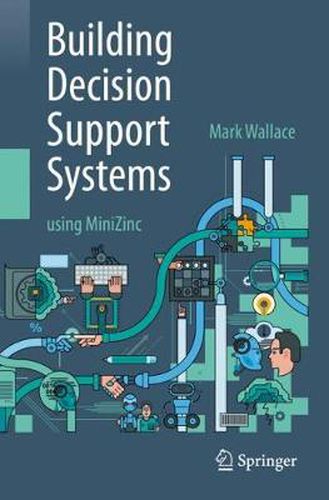Readings Newsletter
Become a Readings Member to make your shopping experience even easier.
Sign in or sign up for free!
You’re not far away from qualifying for FREE standard shipping within Australia
You’ve qualified for FREE standard shipping within Australia
The cart is loading…






This title is printed to order. This book may have been self-published. If so, we cannot guarantee the quality of the content. In the main most books will have gone through the editing process however some may not. We therefore suggest that you be aware of this before ordering this book. If in doubt check either the author or publisher’s details as we are unable to accept any returns unless they are faulty. Please contact us if you have any questions.
This book introduces readers to the principles of intelligent decision support systems (IDSS) and how to build them with MiniZinc, a free, open-source constraint programming language. Managing an IDSS project requires an understanding of the system’s design and behaviour. The book enables readers to appreciate what combinatorial optimisation problems are, and how modelling a problem provides the basis for solving it. It also presents the main algorithms for tackling decision support problems, discusses their strengths and weaknesses, and explores ways of achieving the necessary scalability when problems become big. Moreover, to support the learning process it allows readers to try out the ideas described in the text on model applications and puzzles.
The book highlights the potential benefits of deploying an IDSS. It enables users to recognise the key risks involved and identify which techniques can be applied to minimise them, and to understand the decision support technology sufficiently in order to manage or monitor an IDSS project. It also helps readers distinguish between good sense and mere jargon when dealing with anyone involved in an IDSS project, from sales personnel to software implementers. As such it especially appeals to graduate students and advanced professionals who need to learn how to build an IDSS and to tackle the problems on the way.
$9.00 standard shipping within Australia
FREE standard shipping within Australia for orders over $100.00
Express & International shipping calculated at checkout
This title is printed to order. This book may have been self-published. If so, we cannot guarantee the quality of the content. In the main most books will have gone through the editing process however some may not. We therefore suggest that you be aware of this before ordering this book. If in doubt check either the author or publisher’s details as we are unable to accept any returns unless they are faulty. Please contact us if you have any questions.
This book introduces readers to the principles of intelligent decision support systems (IDSS) and how to build them with MiniZinc, a free, open-source constraint programming language. Managing an IDSS project requires an understanding of the system’s design and behaviour. The book enables readers to appreciate what combinatorial optimisation problems are, and how modelling a problem provides the basis for solving it. It also presents the main algorithms for tackling decision support problems, discusses their strengths and weaknesses, and explores ways of achieving the necessary scalability when problems become big. Moreover, to support the learning process it allows readers to try out the ideas described in the text on model applications and puzzles.
The book highlights the potential benefits of deploying an IDSS. It enables users to recognise the key risks involved and identify which techniques can be applied to minimise them, and to understand the decision support technology sufficiently in order to manage or monitor an IDSS project. It also helps readers distinguish between good sense and mere jargon when dealing with anyone involved in an IDSS project, from sales personnel to software implementers. As such it especially appeals to graduate students and advanced professionals who need to learn how to build an IDSS and to tackle the problems on the way.